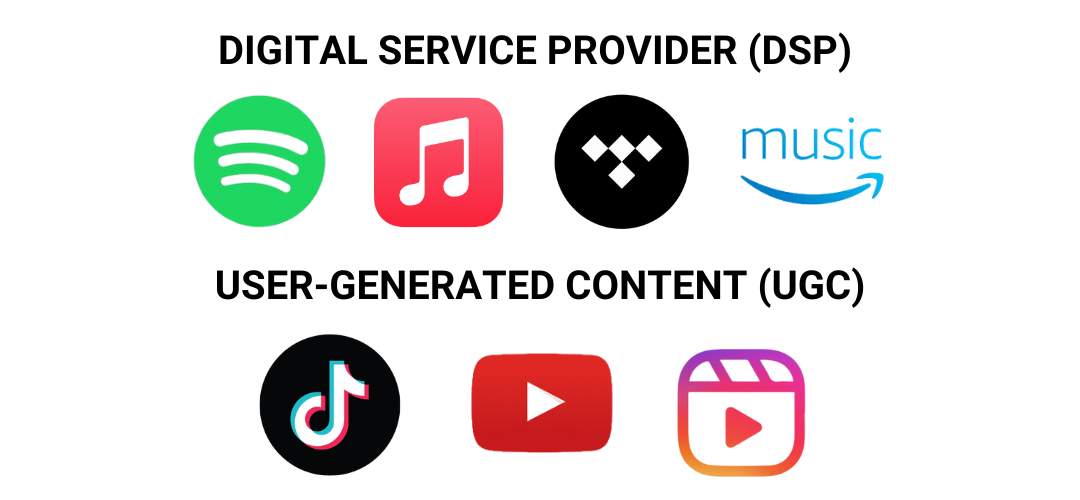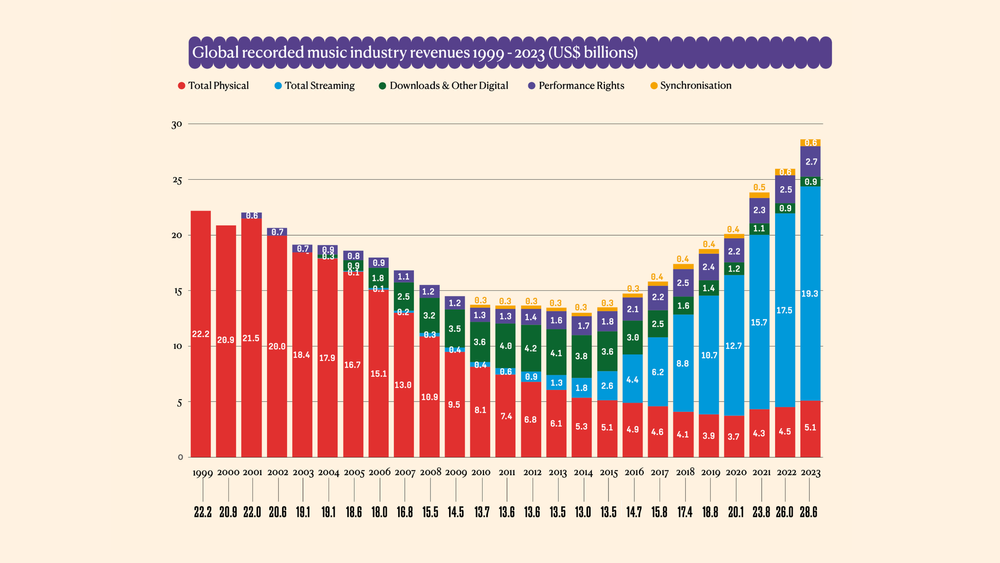Fair Pay for Every Play
ACTRA RACS Fights for Fair Streaming Rights
The music industry has experienced a significant transformation in how we consume music, shifting from physical media like CDs and vinyl, and traditional broadcast mediums like radio, to predominantly on-demand digital streaming platforms such as Spotify and Apple Music. The rise of these services has revolutionized the music industry, offering unprecedented access to music to a growing base of listeners. By 2027, the number of users is expected to rise to 9.9 million with revenues expected to surpass $500 million.i There’s no doubt that these services have made the lives of consumers more convenient but can the same be said for musicians and performers?
It’s increasingly difficult for artists—particularly session and indie musicians—to earn a living. The pandemic exposed the precariousness of artists in our current technological reality, and despite the massive success of these services, artists are left in a difficult position, when they’re unable to earn revenue performing live. With low barriers to entry, multiple distribution platforms, multiple revenue streams and an endless choice of tools to work with, artists are equivalent to small businesses. Fair payments help to revalue, dignify, and empower artists in our society. This general basic principle is mentioned in a host human rights documents such as in Article 27 of the United Nation’s Universal Declaration of Human Rights:
“Everyone has the right to the protection of the moral and material interests
resulting from any scientific, literary, or artistic production of which he is the author.”
Bottom line, using work without proper payment is more than just demoralizing, it’s against human rights. As a Recording Artists’ Collective, our goal is to start a conversation so that together, we can reform the present system with a solution that ensures that they are fairly compensated for the work.

Let’s Talk About the Current Situation
With the rise of streaming, traditional models like radio are diminishing and along with it, the royalties that help sustain the careers of recorded performers. As these revenue streams decline for performers, the reliance on streaming continues to rise. Year after year, streaming services, and the industry are declaring massive revenues, while performers continue to struggle. If we look at the numbers, they reveal that the music industry is booming, generating $28.6 billion in 2023, with $19.3 billion of that coming from streaming revenue. But where is that income for the artists?

Despite these statistics, streaming services are hiding the full extent of their revenue, while industry-wide costs have seen a significant reduction. However, from the artist’s perspective, they are not only more reliant on streaming than ever before—often their primary source of revenue — but they also bear significantly more costs now compared to the past. Yet this new digital reality has resulted in performers seeing almost no financial benefit from their work being streamed, with some even making nothing. Take for example, session musicians who are paid an upfront fee and then not shared future income from recordings.
It’s the performers that drive fans to streaming platforms through their recording and marketing efforts, contributing to a reduction in the platform’s subscriber acquisition costs, as well as generating millions of dollars for them. Many of the DSPs and UGCs now generate further content, such as audiobooks and podcasts, with the original subscriber base built on the backs of music artists. These artists have not seen any increase in payments, while Spotify’s wealth accumulates for themselves, investors, and the industry at large. So why won’t streaming services pay a fair share?
Many performers remain subject to outdated contract models, receiving disproportionately small payments (if any) for their work. These agreements established in an era of traditional music distribution have not been updated to reflect these modern technologies. They have no ability to negotiate directly with DSPs and UGCs or secure royalties directly, as their rights are systematically transferred to labels. By omitting them from the current structure, it cuts them completely out of the value chain and at a disadvantage with no efforts being made to revise them in their favour.
We advocate for DSPs, UGCs, and the industry to pay artists a fair contemporary digital royalty rate. A more equitable payment system will ensure that the benefits of this new technology to genres that have been largely overlooked in this new wealth model.
In a national context, the current system of compensating Canadian musical artists in the streaming era is inadequate and unjust. With this on-demand streaming world, we need a new and modern solution. It’s imperative that streaming services pay their fair share to ensure Canadian performers receive their compensation. Exposure alone is not a viable means of livelihood for artists, while streaming services continue to profit substantially.
ACTRA RACS Proposal
Artists deserve a fair share of the revenue generated by their work. ACTRA RACS is committed to fight for a new financial model, one that learns from global examples and ensures appropriate compensation from streaming services. Only by ensuring that streaming services contribute their fair share can Canadian performers hope to achieve fair compensation for their invaluable contributions to the music industry.
Rights need to be modernized for the streaming era, as the current structure is not benefiting artists as much as those who are exploiting them economically. Looking around the world, we’re seeing new and unique rights become established specifically for performers in this new reality, setting them up for a better future. Performers should have a right over the work that they create, however this right doesn’t currently exist. We want them to have the agency to negotiate a modern contract. Meaning payment goes directly to artists (via CMO) as a non-recoupable amount. Some countries which have attempted to address this problem: AIE (Spain), PlayRight (Belgium), GDA (Portugal), EJI (Hungary), PI (Serbia), France (Spedidam, ADAMI), FKMP (South Korea), SUDEI (Uruguay). To ensure fair compensation, Canada must adopt similar measures to those emerging globally — clear rights for performers in the on-demand and user-generated content streaming world.
For example, in Spain performers are given a percentage of streaming service’s gross revenue (Spain’s AIE suggest up to 5%). They collected $5 million euros in 2021 for performers from various streaming services, not including Apple, who were still being negotiated with, or most AV-related streaming services. With this right, they found that there were:
- Virtually no impact to the market with Spanish labels continuing to grow.
- Little impact to streaming service revenue.
Similar changes have occurred in Germany, Belgium, and Serbia, among others. This right allows all performers to retain the ability to negotiate directly with streaming services and receive an appropriate share of revenues. Reviews have shown that there has been no impact to labels in their ability to secure payment for exclusive rights, nor the streaming services ability to function in that territory.